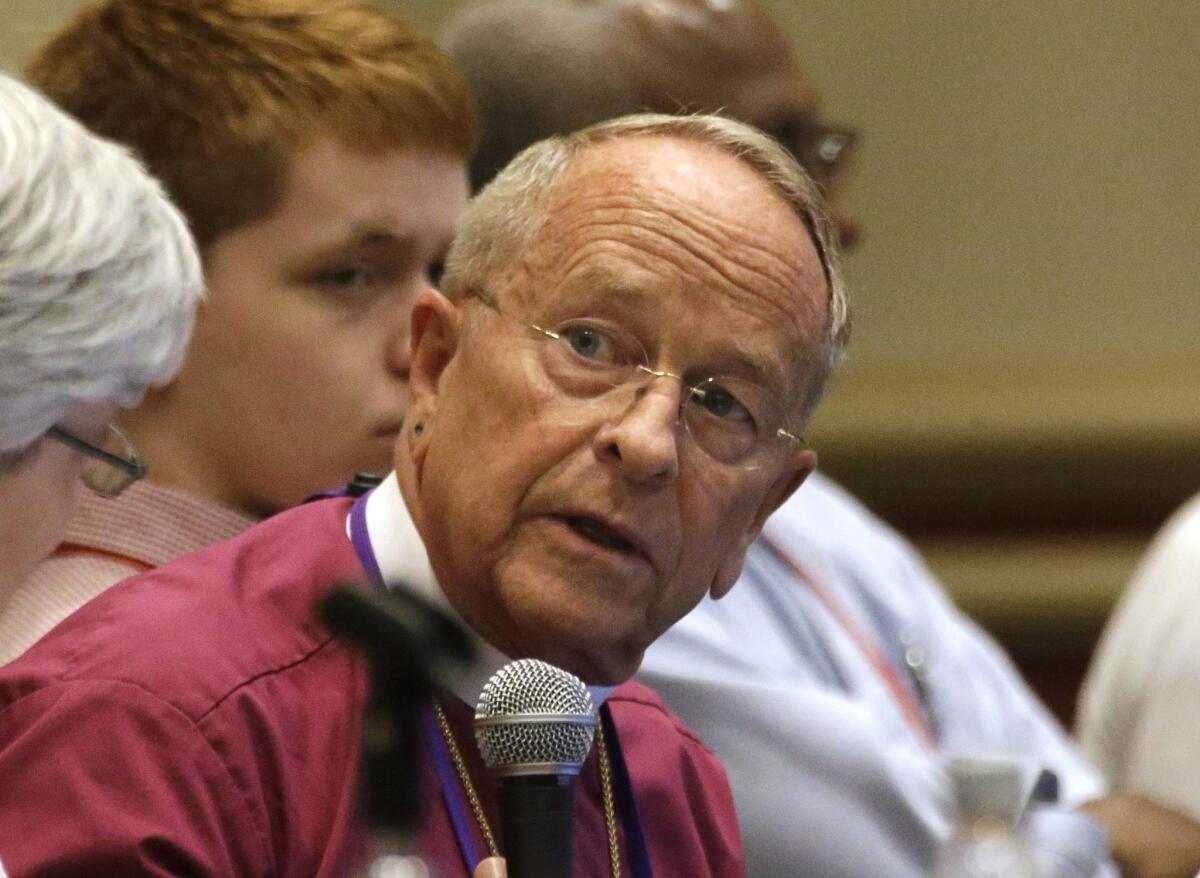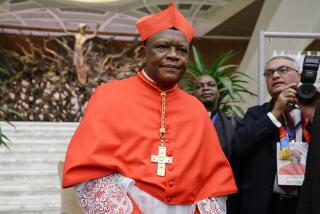Episcopal Church formally embraces same-sex marriage

Gene Robinson, who in 2003 became the first openly gay Episcopal bishop, attends the Episcopal General Convention in Salt Lake City on June 25.
- Share via
Reporting from Salt Lake City — Episcopalians overwhelmingly voted Wednesday to allow religious weddings for same-sex couples, solidifying the church’s embrace of gay rights that began more than a decade ago with the election of the first openly gay bishop.
The vote came in Salt Lake City at the Episcopal General Convention, days after the U.S. Supreme Court legalized gay marriage nationwide. It passed in the House of Deputies, the voting body of clergy and lay participants at the meeting. The House of Bishops had approved the resolution Tuesday, 129-26, with five abstaining.
The Very Rev. Brian Baker of Sacramento said the church rule change was the result of a nearly four-decade conversation that has been difficult and painful for many. Baker, chairman of the committee that crafted the changes, said that church members have not always been kind to one another but that the dynamic has changed in recent decades.
“We have learned to not only care for, but care about one other,” Baker said. “That mutual care was present in the conversations we had.... Some people disagreed deeply, but we prayed and we listened and we came up with compromises that we believe make room and leave no one behind.”
Baker said the denomination’s House of Bishops prayed and debated the issue for five hours this week before passing it on to the House of Deputies.
The vote eliminates gender-specific language from church laws on marriage so that same-sex couples can have religious weddings. Instead of “husband” and “wife,” for example, the new church law will refer to “the couple.” Under the new rules, clergy can decline to perform the ceremonies. The changes were approved with a vote of 173-27. The convention also approved a gender-neutral prayer service for marriage on a 184-23 vote.
The measures take effect the first Sunday of Advent, Nov. 29.
Many dioceses in the New York-based church of nearly 1.9 million members have allowed their priests to perform civil same-sex weddings, using a trial prayer service to bless the couple. Still, the church hadn’t changed its own laws on marriage until Wednesday.
The Episcopal Church joins two other mainline Protestant groups that allow same-sex marriage in all their congregations: the United Church of Christ and the Presbyterian Church (U.S.A.). The 3.8-million-member Evangelical Lutheran Church in America lets its congregations decide for themselves, and many of them host same-sex weddings.
The United Methodist Church -- which, with 12.8 million members, is by far the largest mainline Protestant church -- bars gay marriage, although many of its clergy have been officiating at same-sex weddings recently in protest.
The Episcopal Church is the U.S. wing of the Anglican Communion, an 80-million-member global fellowship of churches based in England. Ties among Anglicans have been strained since Episcopalians in 2003 elected Bishop Gene Robinson, who lived openly with his male partner, to lead the Diocese of New Hampshire.
On the eve of the U.S. vote, Archbishop of Canterbury Justin Welby, spiritual leader of the world’s Anglicans, issued a statement expressing deep concern about the move to change the definition of marriage.
Faith groups across the spectrum of belief, from the Episcopal Church to the Southern Baptists, have been losing members as more Americans say they identify with no particular religion. The Episcopal Church has shrunk 18% over the last decade, after more than a generation of steady decline.
After the Supreme Court ruling last week, many conservative churches, including the Southern Baptists and the Mormons, renewed their opposition to same-sex marriage.
The gay marriage decision is the second major news to come from the convention, the top policymaking body of the church. The church elected its first black presiding bishop last weekend, with Bishop Michael Curry of North Carolina winning in a landslide.
Curry has allowed same-sex church weddings in North Carolina, and he said the Supreme Court “affirmed the authenticity of love” by legalizing gay marriage.
More to Read
Sign up for Essential California
The most important California stories and recommendations in your inbox every morning.
You may occasionally receive promotional content from the Los Angeles Times.










